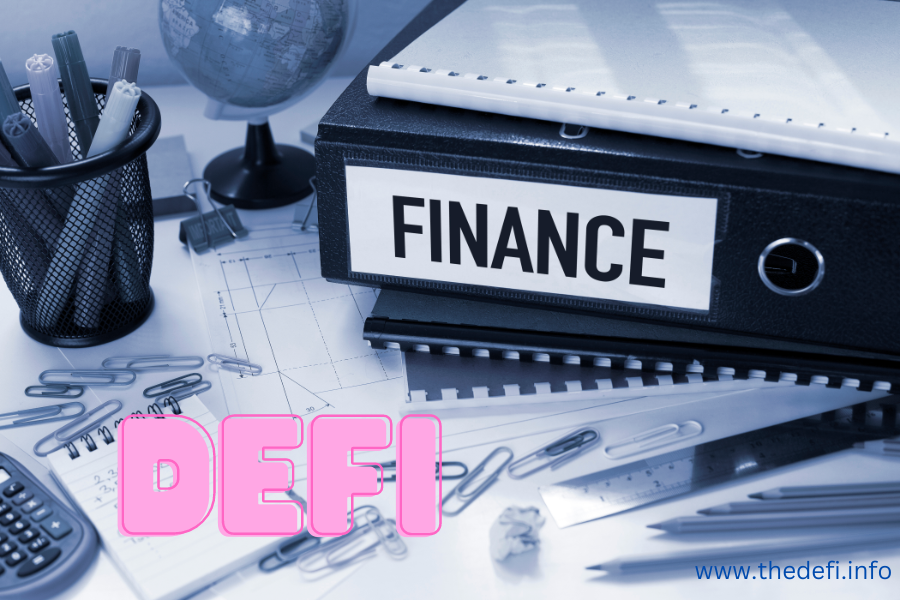What is Decentralized Finance
Decentralized Finance is a groundbreaking financial and technological innovation to image in recent years. This technology is commonly known as DeFI. DeFI represents a complete paradigm shift in how financial services can be accessed by a regular person, through the blockchain technology. It is an open, permissionless, and decentralized ecosystem. This article dives deep into the concept of DeFI, its benefits, challenges, and provides answers to frequently asked questions (FAQs) to help you comprehend this revolutionary technology.
Unleashing Financial Freedom through Decentralized Finance
DeFI refers simply to financial applications and or web3 platforms that are developed on a blockchain technology. Majority of which are built on the Ethereum network. Unlike traditional centralized financial systems (CeFi) that rely on centralized entities such as banks, DeFI on the other hand works in a trustless and decentralized manner. Practically anything or any product you can get from CeFi can be replicated of DeFi including but not limited to lending, borrowing, trading, yield farming, asset management, and many more.
Main Characteristics of DeFI:
- Decentralization: DeFi platforms run on decentralized networks, eliminating the need for intermediaries and granting users more control over their assets.
- Open Access: DeFi applications are accessible to anyone with an internet connection, promoting financial inclusion on a global scale.
- Interoperability: DeFi protocols are often interoperable, enabling users to combine different services seamlessly.
- Transparency: All transactions and operations within DeFi are recorded on the blockchain, ensuring transparency and auditability.
- Programmability: Smart contracts govern DeFi protocols, enabling automated and self-executing financial transactions.
Pros of Decentralized Finance
DeFi comes with several advantages which has potential to completely change the way we view financial system:
- Global Accessibility: DeFi platforms are accessible to anyone, regardless of their geographic location or financial status.
- Reduced Intermediaries: By eliminating intermediaries, DeFi reduces transaction costs and potential points of failure.
- Financial Inclusion: DeFi provides banking services to the unbanked and underbanked populations worldwide.
- Innovation: The open nature of DeFi encourages innovation, leading to the rapid development of new financial products and services.
- Security: DeFi applications employ advanced cryptographic techniques, enhancing security and reducing the risk of fraud.
Cons of Decentralized Finance
While DeFi is quite promising, it however has some cons and risks that users ought to be aware of:
- Smart Contract Risks: Vulnerabilities in smart contracts can lead to exploits and financial losses.
- Regulatory Uncertainty: Decentralized Finance operates in a regulatory gray area in many jurisdictions, potentially leading to legal issues.
- Liquidity Issues: Some DeFi platforms may experience liquidity shortages, affecting users’ ability to execute trades or transactions.
- User Error: DeFi requires users to manage their private keys and interact with complex interfaces, increasing the risk of user error.
- Market Volatility: The decentralized nature of DeFi doesn’t shield users from the inherent volatility of cryptocurrency markets.
DeFi FAQs: Demystifying the Concept
- What is a Decentralized Exchange (DEX)? A DEX is a platform that enables users to trade cryptocurrencies directly with one another without the need for intermediaries. It operates in a peer-to-peer manner and offers greater privacy and control over assets.
- How does Yield Farming work? Yield farming involves lending or staking cryptocurrencies on DeFi platforms to earn rewards. Users provide liquidity to various protocols, earning interest or fees in return.
- Are DeFi platforms secure? While many DeFi platforms implement robust security measures, risks remain due to vulnerabilities in smart contracts and user errors. It’s crucial to conduct thorough research and use secure platforms.
- Can I earn interest on my cryptocurrency holdings through DeFi? Yes, many DeFi platforms offer lending and borrowing services where you can earn interest on deposited assets or borrow assets by providing collateral.
- Is investing in DeFi risky? Like any investment, DeFi carries risks due to market volatility, potential smart contract vulnerabilities, and regulatory uncertainty. It’s important to only invest what you can afford to lose and to do thorough research.
- How do I get started with DeFi? To get started with DeFi, you’ll need to set up a cryptocurrency wallet, acquire some cryptocurrency like Ethereum, and then find a reputable DeFi platform to interact with. Be prepared to learn about different protocols and their risks.
The Future of Finance: DeFi’s Potential Impact
Decentralized finance has huge potential to revolutionize financial industry as we know it. DeFi provides accessibility to financial services to the unbanked, ii is efficient, and inclusive to anyone around the world. DeFi was originally clunky and difficult to navigate without son knowledge of computer coding, however, with the development of more and more user-friendly interfaces it is anticipated that there will be a broader adoption of DeFi. However, when interacting with any DeFi or any crypto products of any nature, you must remain extremely cautious, educate yourself and know the risks to ensure you remain as safe as possible when participating in the DeFi ecosystem.
Check out: How blockchain technology works & Benefits & Popularity!

